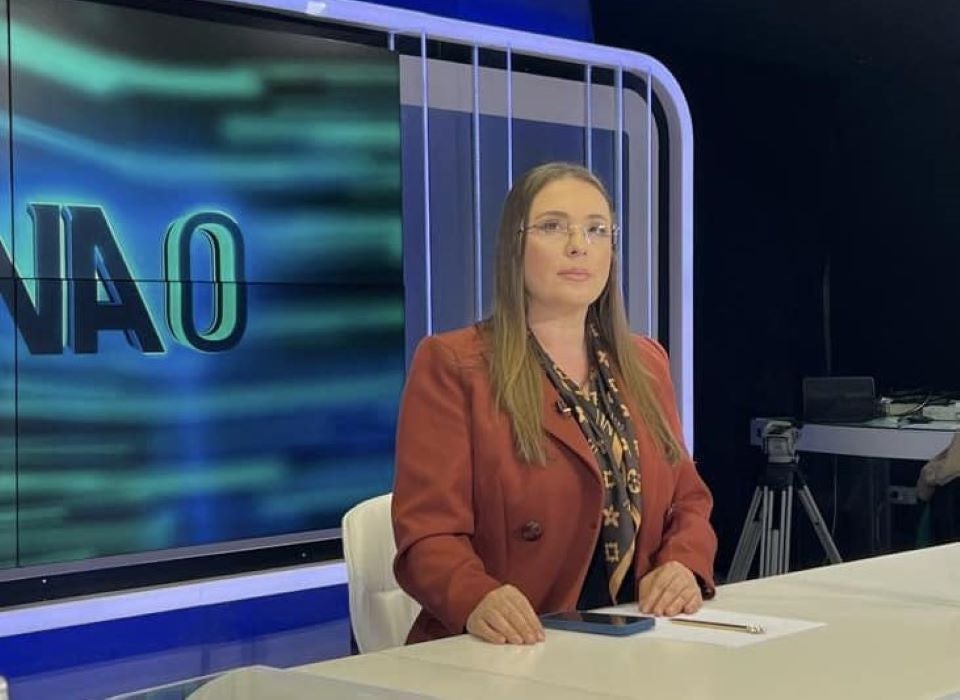FOR ALL Women and Girls: Anila Hoxha, the story of a journalist who broke the silence on violence
With almost three decades of reporting at the intersection of crime, justice, and social issues, Albanian journalist Anila Hoxha has become a powerful voice for women silenced by violence. A long-standing member of the UN Women Media Forum in Albania, she brings attention to femicide, economic injustice, and the systemic barriers women face, through her podcasts, investigations, and advocacy for gender-sensitive reporting.
Date:

Finding her voice
Her commitment to reporting on gender-based violence started at university. In 1999, a young woman, a fellow student, was murdered near the dormitories, a crime that remains unsolved. That moment shifted something in Anila. Journalism became her means to seek justice and give voice to those whose stories are too often ignored. From the start, she understood that journalists have a duty not just to inform, but to drive change.
When Albania’s domestic violence law was first introduced, women were still afraid to speak out. Anila persisted, broadcasting the national hotline number repeatedly, until one day a woman – all bruised and with a broken arm – walked into the newsroom, sent by a doctor who had told her, “Go to the journalist who won’t stop reporting.”
After years of abuse and being dismissed by police who once told her, “We hit our wives, too,” the woman did not want her face shown and said that she was there because she just wanted help to win custody of her children. Anila responded with care and sensitivity, ensuring the woman’s voice was heard and her dignity preserved. “That story broke through the wall of silence I had been addressing for so long,” Anila recalls.
“In my reports, I have often stressed the message: ‘do not back down from speaking out,’ even though facing such pressure alone, especially the pressure of a deeply rooted social norms, is incredibly difficult,” she says. “That’s why we must all move together, at the same pace and in the same direction: the psychologist, the sociologist, the legal expert. Because if even one of the parts of the system fails, if our justice system does not rehabilitate and teach that violence against women is a crime but merely locks someone away, the entire process of change slows down.”
Participation in the International Journalism Festival
Anila’s participation in the International Journalism Festival in Perugia, supported through the UK Government, deepened her commitment to human-centered reporting. The opportunity was part of a broader project implemented by UN Women in Albania, with support from the British Embassy, aimed at strengthening gender equality in the media.
At the festival, one session that resonated deeply with her was led by Natalia Antelava, an investigative journalist covering human rights abuses in war zones. She emphasized the importance of empathy and the importance of listening, especially to those who hesitate to speak. Similarly, Nobel Peace Prize laureate Maria Ressa highlighted the critical role of integrity in journalism, reminding everyone that “when done ethically, journalism is not a crime.” Ressa’s words stayed with Anila, especially as she recalled how Ressa maintained that belief despite the online attacks she endured. This powerful message further strengthened Anila’s solution-driven approach in her daily work.
Gender equality through a journalist’s lens
Reflecting on gender equality in Albania, Anila acknowledges improvements but warns against complacency. “It can make us think things are better and we stop pushing for further progress. Women are more outspoken today, and many advancements have been made, but there is still much work to be done to achieve true equality,” she says.
Part of that work, she believes, begins from within. “Telling women’s stories requires more than empathy, it requires a gender lens,” she says. “And adopting it as a journalist is not easy. It takes working from the inside, experience, courage, and integrity. You build them up slowly, while unlearning the mindset that shaped you since childhood.” Today, her reporting focuses on femicide. “It’s not enough to say, ‘report on it.’ My challenge is to report in a way that moves people. That forces action. That demands accountability.”
A journalist’s message to all women and girls
For Anila, and for all journalists who see their work as a mission, the light of hope shines through a powerful truth she heard from a colleague at the International Journalism Festival: "We do not have the privilege to give up."
Anila’s message to ALL women and girls, especially in Albania, is simple and powerful:
"Live your own life, not the one society expects of you. Once you embrace this truth, you become unstoppable. And with that strength, there is nothing you cannot achieve."